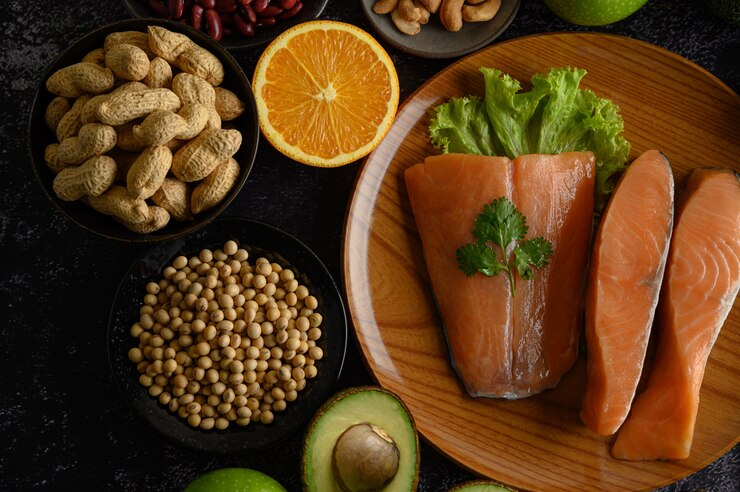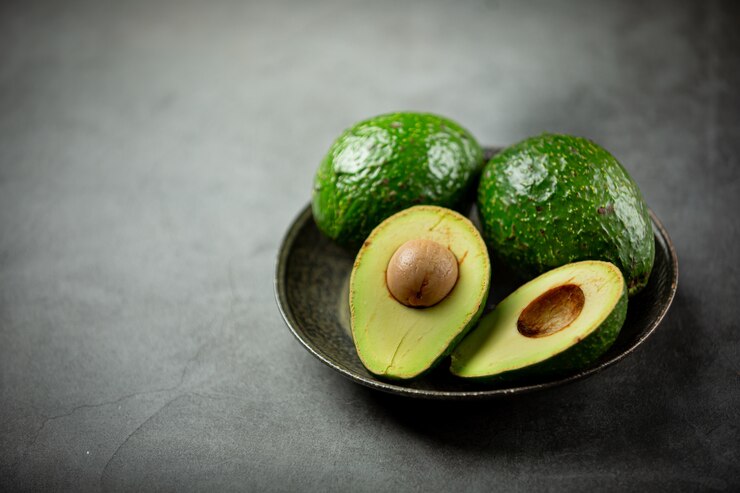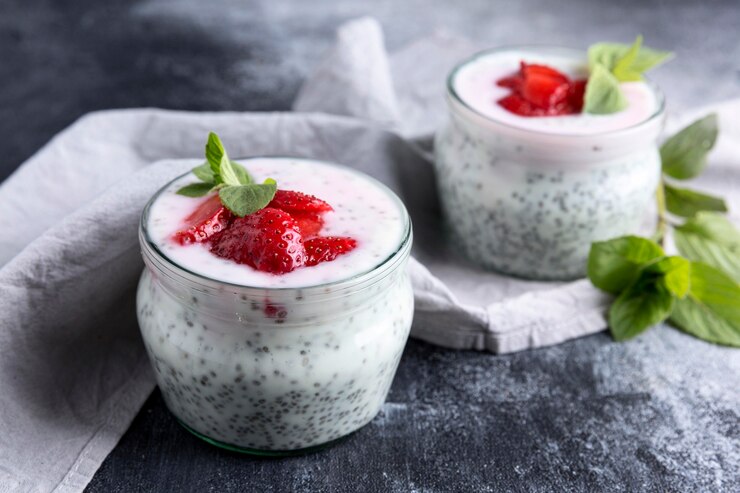Superfoods for Seniors: Boost Your Health with These Secrets

Aging brings wisdom, experience, and wonderful memories but also new health challenges. From maintaining strong bones to supporting cognitive function, seniors need a nutrient-rich diet to help tackle these challenges. Superfoods, packed with vitamins, minerals, and antioxidants, offer an excellent way to nourish the body and keep it functioning at its best.
While most of us know the importance of fruits, vegetables, and lean proteins, some lesser-known foods can have an incredible impact on seniors’ health. This post’ll uncover the secret superfoods that can boost your health, enhance vitality, and promote longevity.
What Are Superfoods and Why Are They Important for Seniors?

Superfoods are nutrient-dense foods that provide significant vitamins, minerals, and antioxidants with relatively few calories. These foods are essential for seniors because they help address key health concerns with age, such as decreased bone density, cognitive decline, and a weakened immune system.
As we age, the body’s ability to absorb nutrients declines, making consuming foods rich in nutrients even more important. Superfoods can help seniors fill these nutritional gaps while protecting against common age-related diseases like heart disease, osteoporosis, and dementia.
Top Superfoods for Seniors
Let’s explore some of the most powerful superfoods that can make a positive difference in seniors’ lives:
a. Berries: Nature’s Antioxidant Powerhouses

Berries, such as blueberries, strawberries, and raspberries, are bursting with antioxidants that help fight oxidative stress, which accelerates aging. These tiny fruits also improve brain function, support heart health, and have anti-inflammatory properties.
Health Benefits for Seniors:
- Antioxidants in berries can protect against cognitive decline.
- Rich in fiber, berries aid digestion and help control blood sugar levels.
- Their anti-inflammatory properties reduce the risk of chronic diseases.
How to Add Berries to Your Diet:
- Toss them in your morning yogurt or oatmeal.
- Add them to a smoothie or simply enjoy them as a snack.
b. Leafy Greens: Nutrient-Dense for Strong Bones

Leafy greens like spinach, kale, and collard greens are packed with calcium, Vitamin K, and antioxidants, making them essential for bone health. As seniors are more prone to osteoporosis, these greens can help maintain strong bones and prevent fractures.
Health Benefits for Seniors:
- High in calcium and Vitamin K, which are crucial for bone strength.
- The fiber in leafy greens promotes healthy digestion.
- Their antioxidants help fight inflammation, supporting overall wellness.
How to Include Leafy Greens:
- Add them to salads or smoothies.
- Sauté them with a little olive oil and garlic for a quick side dish.
c. Fatty Fish: Omega-3 for Heart and Brain Health

Fatty fish, such as salmon, mackerel, and sardines, are rich in omega-3 fatty acids. These healthy fats reduce inflammation, improve heart health, and support brain function, making them particularly beneficial for seniors.
Health Benefits for Seniors:
- Omega-3s reduce the risk of heart disease, which is a leading cause of death among seniors.
- These fatty acids improve cognitive function and may help prevent dementia and Alzheimer’s.
- Omega-3s also help reduce joint inflammation, making them great for seniors with arthritis.
How to Include Fatty Fish:
- Bake or grill salmon for dinner.
- Enjoy sardines or mackerel in salads or on whole-grain toast.
d. Nuts and Seeds: Heart-Healthy Fats and Protein

Nuts like almonds, walnuts, and seeds like chia and flaxseeds are packed with heart-healthy fats, protein, and fiber. These foods are also excellent sources of antioxidants and essential vitamins and minerals that support heart and brain health.
Health Benefits for Seniors:
- Nuts and seeds help lower bad cholesterol levels, protecting heart health.
- They provide a good source of protein, which is essential for maintaining muscle mass.
- The antioxidants in nuts and seeds support brain health and reduce inflammation.
How to Incorporate Nuts and Seeds:
- Add chia seeds to your morning smoothie or oatmeal.
- Snack on a handful of mixed nuts or sprinkle them on salads.
e. Whole Grains: Boosting Energy and Digestion

Whole grains like quinoa, brown rice, and oats provide a wealth of nutrients, including fiber, vitamins, and minerals. They help regulate blood sugar levels, support heart health, and promote digestive regularity.
Health Benefits for Seniors:
- The fiber in whole grains helps prevent constipation, a common issue among seniors.
- Whole grains support heart health by lowering cholesterol and blood pressure.
- They provide long-lasting energy and help maintain a healthy weight.
How to Include Whole Grains:
- Use quinoa or brown rice as a base for salads or grain bowls.
- Enjoy oatmeal for breakfast or as a healthy snack.
f. Avocados: Healthy Fats for Heart and Brain Health

Avocados contain heart-healthy monounsaturated fats, fiber, and essential vitamins like potassium and folate. These nutrients are vital for maintaining heart health and cognitive function as we age.
Health Benefits for Seniors:
- Avocados help lower bad cholesterol and maintain healthy blood pressure levels.
- They provide potassium, which supports heart health and helps prevent high blood pressure.
- Their healthy fats improve brain function and may help reduce the risk of cognitive decline.
How to Incorporate Avocados:
- Spread avocado on whole-grain toast.
- Add it to salads or smoothies for a creamy texture.
g. Turmeric: The Anti-Inflammatory Super Spice

Turmeric has long been used in traditional medicine for its powerful anti-inflammatory and antioxidant properties. The active compound in turmeric, curcumin, can help reduce arthritis symptoms, fight inflammation, and improve cognitive health.
Health Benefits for Seniors:
- Curcumin helps reduce inflammation in joints, easing arthritis pain.
- Its antioxidant properties help protect brain cells, reducing the risk of Alzheimer’s.
- Turmeric may also improve heart health by lowering inflammation in the blood vessels.
How to Use Turmeric:
- Add turmeric to soups, stews, or curries.
- Enjoy a warm turmeric latte for a soothing, health-boosting drink.
h. Greek Yogurt: Probiotics for Gut Health

Greek yogurt is rich in protein and calcium and contains probiotics, the good bacteria that promote a healthy gut. As gut health is closely linked to immune function, Greek yogurt is a great addition to any senior’s diet.
Health Benefits for Seniors:
- Probiotics support gut health, improving digestion and immune function.
- High in calcium, Greek yogurt helps maintain bone density and prevent osteoporosis.
- It also provides a good source of protein, which is essential for muscle health.
How to Enjoy Greek Yogurt:
- Mix it with fresh fruit and honey for a delicious and healthy snack.
- Use it as a base for smoothies or a substitute for sour cream in recipes.
i. Sweet Potatoes: Vitamin-Packed Energy Boosters

Sweet potatoes are rich in vitamins A and C, fiber, and potassium, making them nutritious for seniors. These vibrant root vegetables support immune function, promote good vision, and provide energy-boosting carbohydrates.
Health Benefits for Seniors:
- Vitamin A supports eye health, helping prevent age-related vision issues.
- The fiber in sweet potatoes aids digestion and promotes a healthy gut.
- Sweet potatoes also help regulate blood pressure thanks to their potassium content.
How to Include Sweet Potatoes:
- Bake sweet potatoes for a side dish or mash them for a creamy alternative to regular potatoes.
- Add roasted sweet potatoes to salads or grain bowls for flavor and nutrients.
j. Dark Chocolate: A Heart-Healthy Indulgence

Dark chocolate, when eaten in moderation, can be a heart-healthy treat. Rich in flavonoids, dark chocolate helps improve circulation, reduce inflammation, and lower blood pressure.
Health Benefits for Seniors:
- The flavonoids in dark chocolate improve heart health by relaxing blood vessels and increasing blood flow.
- It’s also known to enhance mood by boosting serotonin levels.
- Dark chocolate supports cognitive function, helping protect against memory decline.
How to Indulge:
- Enjoy a small piece of dark chocolate daily.
- Add it to smoothies or pair it with nuts for a healthy, satisfying snack.
Practical Ways to Incorporate Superfoods into Your Daily Diet

Incorporating superfoods into your daily meals doesn’t have to be overwhelming. With a few smart strategies, you can effortlessly add these nutrient-rich foods to your routine. Here’s how:
a. Make Superfoods the Star of Your Meals
Design your meals around superfoods by ensuring they take center stage on your plate. For example, start your day with a breakfast with antioxidant-packed berries, fiber-rich oats, and a protein boost from Greek yogurt. You could enjoy a vibrant salad filled with leafy greens, healthy fats from avocados, and a sprinkle of seeds for lunch. Dinners can center around lean proteins like salmon, accompanied by roasted sweet potatoes.
b. Snack Smart with Superfoods
Instead of reaching for processed snacks, opt for nutrient-dense alternatives like nuts, seeds, and fruits. A handful of almonds, walnuts, or a serving of chia pudding can be a perfect between-meal snack that fuels your body while delivering heart-healthy fats and fiber.
c. Superfood Smoothies
Superfood smoothies are a quick and easy way to pack a lot of nutrition into one meal. Blend up berries, leafy greens, yogurt, and seeds for a powerhouse smoothie that gives you a perfect start to the day or a revitalizing afternoon boost. Smoothies also allow you to hide vegetables like spinach or kale, which blend seamlessly with fruit.
d. Spice It Up with Turmeric and Other Super Spices
Don’t underestimate the power of super spices like turmeric, cinnamon, and ginger. Adding a teaspoon of turmeric to soups, stews, or even smoothies can significantly enhance the anti-inflammatory properties of your meal. You can also sprinkle cinnamon over oatmeal or yogurt to regulate blood sugar.
e. Plan and Prep
Plan your meals ahead of time to ensure you’re incorporating superfoods throughout the week. Prepping ingredients like roasted vegetables, quinoa, or smoothie packs ahead of time can make it easier to grab a nutrient-dense meal on busy days. Having a stock of frozen berries, leafy greens, and avocados on hand also ensures you can quickly prepare nutritious meals even when fresh options aren’t available.
The Role of Superfoods in Disease Prevention

Superfoods are not just a nutritional boost; they can also play a pivotal role in preventing common age-related diseases, allowing seniors to lead longer, healthier lives. Here’s how:
a. Cardiovascular Health
Foods rich in omega-3 fatty acids, like fatty fish, and antioxidants found in berries can help reduce the risk of heart disease. Omega-3s lower triglycerides, reduce inflammation, and help maintain healthy blood pressure, while the flavonoids in dark chocolate and berries support proper blood circulation and reduce cholesterol levels.
b. Cognitive Function and Brain Health
Diets rich in anti-inflammatory foods like turmeric and fatty fish are linked to improved brain health and a lower risk of cognitive decline. Superfoods that contain antioxidants, like berries and dark chocolate, combat oxidative stress in the brain, contributing to memory loss and diseases like Alzheimer’s.
c. Bone Strength and Joint Health
Leafy greens, Greek yogurt, and fatty fish are excellent calcium, Vitamin D, and Vitamin K sources, essential for maintaining strong bones and preventing osteoporosis. Superfoods like turmeric and fatty fish also have anti-inflammatory properties that can help ease joint pain, particularly in seniors with arthritis.
d. Gut Health and Immune Support
Greek yogurt and fermented foods, rich in probiotics, promote a healthy gut microbiome, which plays a significant role in overall health, including the immune system. A well-functioning gut can better absorb nutrients, improving digestion and energy levels while preventing conditions like leaky gut syndrome.
e. Eye Health
The Vitamin A in sweet potatoes and the lutein in leafy greens are particularly beneficial for maintaining good vision. These nutrients protect the eyes from macular degeneration and other age-related vision issues that often develop in later years.
Avoiding Common Pitfalls When Incorporating Superfoods

While superfoods offer numerous health benefits, it’s important to avoid certain pitfalls that can negate their positive effects. Here’s what to watch out for:
a. Relying Solely on Supplements
Many seniors are tempted to rely on supplements rather than getting nutrients from whole foods. While supplements can be beneficial in some cases, they often lack the synergistic benefits of whole foods. For instance, fruits’ and vegetables’ fiber, antioxidants, and phytonutrients work together in ways that supplements can’t replicate. Prioritize whole foods first, and consult with a healthcare provider before adding supplements.
b. Overeating Superfoods
While superfoods are incredibly nutritious, it’s important to remember that balance is key. Overconsumption of any food, even healthy ones, can lead to weight gain, digestive issues, or nutrient imbalances. For example, eating too many calorie-dense nuts can contribute to excess weight gain. Moderation is crucial.
c. Ignoring Food Sensitivities
As we age, our bodies may become more sensitive to certain foods. Some seniors may find that certain superfoods, such as dairy or nuts, cause digestive discomfort. It’s essential to listen to your body and identify food sensitivities, adjusting your diet as needed.
d. Focusing Too Narrowly on One or Two Superfoods
There’s a tendency to focus on one “miracle” food, such as kale or blueberries, to solve all health issues. A diverse diet with various nutrient-rich foods is far more beneficial. Eating a range of superfoods ensures you’re getting a broad spectrum of vitamins, minerals, and antioxidants, all of which work together to support different aspects of health.
Conclusion

Superfoods provide a wealth of nutrients to help seniors live longer, healthier, and more vibrant lives. Incorporating berries, leafy greens, fatty fish, and other nutrient-dense foods into your diet can improve your heart health, support brain function, and strengthen your bones.
Start small, and soon, you’ll feel the difference these superfoods make. What are your favorite superfoods? Share your thoughts and ideas in the comments!





